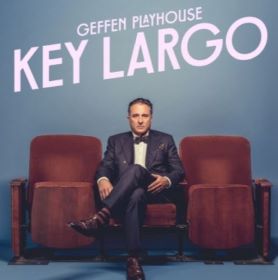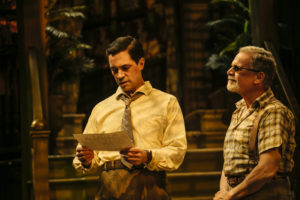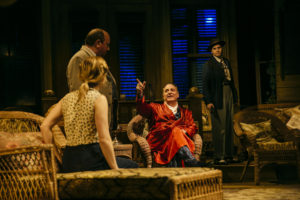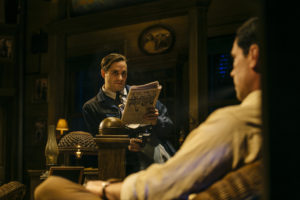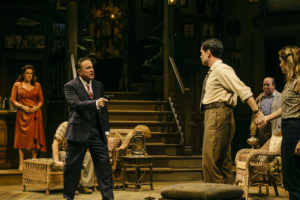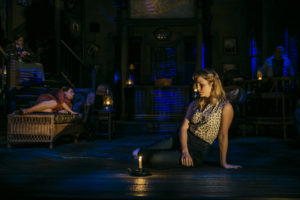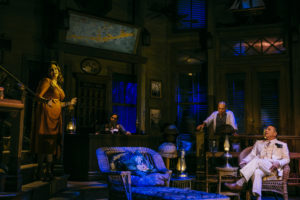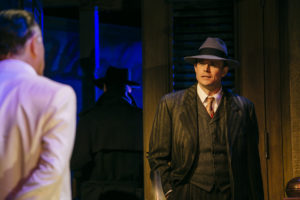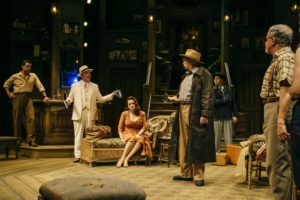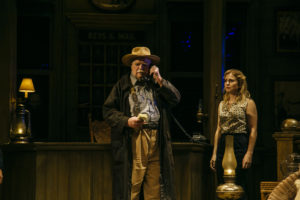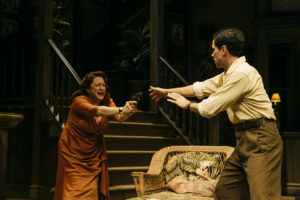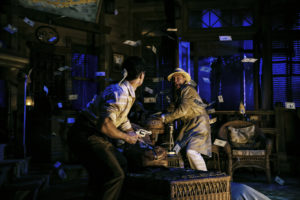NOT AS KEYED UP AS IT SHOULD BE
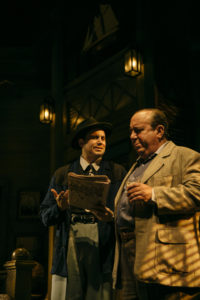 The Geffen Playhouse has really been on a roll under the newest Artistic Director Matt Shakman. There are many more interesting scripts, and many more chances are being taken. And as always, both of Geffen’s playhouses are given Broadway-caliber production values. Shakman is also to be thanked for bringing us plays with bigger casts. While we most likely will never see a Kaufman and Hart-esque 26-character play again here (or most anywhere for that matter), at least we’re edging up from the cost-effective two- and three-character plays. This doesn’t mean that the Geffen is hitting all of them out of the park: The Thanksgiving Play (on until December 6) satires the ultra-left P.C. crowd, but ends up as a long Saturday Night Live-like sketch. Now there’s Key Largo, which opened last week, a nine-character outing updating Maxwell Anderson’s 1939 twenty-four-character play and the ensuing 1948 crime-drama film noir. Utilizing superb craftsmanship, this project fails to wrench out of its premise the suspense needed to validate this adaptation – and a large part of that is miscasting. Still, Shakman and Co. are definitely headed in the right direction.
The Geffen Playhouse has really been on a roll under the newest Artistic Director Matt Shakman. There are many more interesting scripts, and many more chances are being taken. And as always, both of Geffen’s playhouses are given Broadway-caliber production values. Shakman is also to be thanked for bringing us plays with bigger casts. While we most likely will never see a Kaufman and Hart-esque 26-character play again here (or most anywhere for that matter), at least we’re edging up from the cost-effective two- and three-character plays. This doesn’t mean that the Geffen is hitting all of them out of the park: The Thanksgiving Play (on until December 6) satires the ultra-left P.C. crowd, but ends up as a long Saturday Night Live-like sketch. Now there’s Key Largo, which opened last week, a nine-character outing updating Maxwell Anderson’s 1939 twenty-four-character play and the ensuing 1948 crime-drama film noir. Utilizing superb craftsmanship, this project fails to wrench out of its premise the suspense needed to validate this adaptation – and a large part of that is miscasting. Still, Shakman and Co. are definitely headed in the right direction.
At the center of this handsome production is Andy Garcia, who serves as producer (with Frank Mancuso, who oversaw some of Paramount Studios’ greatest efforts), co-adapter with Jeffrey Hatcher, and actor — starring as gangster Johnny Rocco, who is more of a fulcrum here than in the film (played by Edward G. Robinson). The setting for the conflict is a hotel belonging to the family of a GI who was killed in battle. Unit commandeer vet Frank McCloud stops by to pay respects to the family, only to find this island hotel closed and under siege by gangsters led by Rocco staging a summit meeting. Despite the worrisome circumstances, McCloud is welcomed by his buddy’s war widow Nora D’Alcala and blind father-in-law, Mr. D’Alcala, who are both eager for the heroic details about their loved one’s last days — which McCloud will eventually provide.
Yet the ex-soldier is equally willing to disappoint the D’Alcalas’ expectations for similar heroism in their present straits; McCloud hopes only to give Rocco a wide berth and ride out the oncoming hurricane which rages in glorious sight and stereo sound at the Playhouse (lighting by Peter Kaczorowski; sound by Alex Hawthorn). He endures Rocco’s abuse to both himself and his hosts, his cruelty to the local American Indians, and creepy treatment of longtime moll, the alcoholic Gaye Dawn.
Ultimately, though, something cracks in both men when McCloud risks Rocco’s wrath with a small kindness to Gaye, a drink for a drink so to speak, and the die is cast. Both McCloud and Rocco are men adrift in the post-war era, Rocco pining for the glory days of Prohibition, McCloud hoping to leave the past behind and move on to an unknown future. As Rocco’s desperate flailing increases, though, McCloud slowly finds the footing he needs to stand his ground.
This is hands-down one of the most beautiful sets seen at The Geffen, with John Lee Beatty’s lobby interior awash with seaside artifacts lit by skylight. Director Doug Hughes often has Kaczorowski’s lights come from below for shadowy noir effects; Garcia’s giant shadow looming on the back wall is a great touch. And the dialogue holds up quite well, especially given the adapters were working with Anderson’s blank verse.
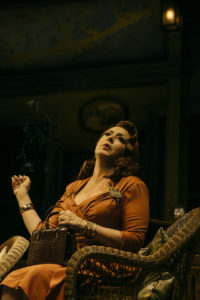 Missing is an authenticity in action; there’s little suspense watching McCloud just leaning up against a wall, and Steve Rankin’s fight sequences are shockingly tame and, worse, unbelievable. Except for the exploding hurricane and Garcia’s menacing unpredictable almost comical behavior, I never sensed an actual threat.
Missing is an authenticity in action; there’s little suspense watching McCloud just leaning up against a wall, and Steve Rankin’s fight sequences are shockingly tame and, worse, unbelievable. Except for the exploding hurricane and Garcia’s menacing unpredictable almost comical behavior, I never sensed an actual threat.
With a melodramatic script like this, there’s one thing John Huston’s film had that is lacking here: Distinctive casting. Danny Pino’s McCloud seems to linger like he’s waiting for a deli order, and Rose McIver’s Nora comes off like a plain Jane with no backstory whatsoever. Tony Plana’s overwrought father-in-law shows no hesitation as he vocally combats the nasty Rocco; sure, he’s blind, but without fear, there’s no conflict. Stephen Borrello, Louis Mustillo, and Bradley Snedeker make convincing thugs, but they’re all short of the character tics that would make such noirish dialogue shine. Richard Riehle could read a phone book and it would be fascinating; his Sherriff Gash kept me fascinated. The winner here is Joely Fisher as the lushy loser addicted to booze and bad guys. Yeah, it’s a helluva role, winning a best supporting Oscar for Claire Trevor. But Fisher has those magic genes (daughter of singer Eddie Fisher and actress Connie Stevens) and an internal life that makes her positively magnetic.
The evening isn’t a bore by a long shot, it’s just not as keyed up as it should be.
photos by Jeff Lorch
poster photo by Yann Rabanier
Key Largo
Audrey Skirball Kenis Theater
Geffen Playhouse, 10866 Le Conte Avenue in Westwood
Tues-Fri at 8; Sat at 3 & 8; Sun at 2 & 7
ends on December 15, 2019
for tickets, call 310.208.5454 or visit Geffen Playhouse
